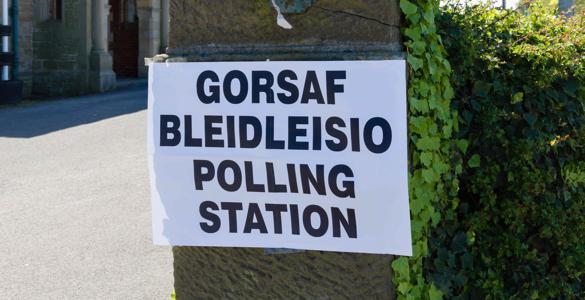Registering to vote for Senedd and local government elections in Wales may become a thing of the past, if a new Bill going through the Senedd becomes law.
The Elections and Elected Bodies (Wales) Bill would allow the Government to introduce new pilots that would automatically register voters.
The Bill would also introduce other changes to the details of how elections are run, including a new all-Wales body responsible for the co-ordination of Welsh elections, a new online voter information programme, and measures to increase diversity in the Senedd and local government in Wales.
What would automatic voter registration for Welsh devolved elections look like?
Since 2014, voters in the UK have needed to register to vote themselves, under the Individual Electoral Registration (IER) system. Local authorities must contact each household to check the existing list is accurate, identify new voters, and invite residents to apply to be on the register. This replaced the old household registration system, where the ‘head of household’ submitted the registration on behalf of all residents at an address.
The Wales Act 2017 devolved responsibility for Senedd and Welsh local elections to the Welsh Government. In the same year, the Welsh Government launched a consultation on expanding the methods available for voter registration. It said that:
[The IER system] has led to a fall in the numbers [of voters] registered, particularly amongst certain groups. The inability of landlords to register their tenants has led to big drops in the numbers of students on the electoral roll and there are also problems associated with other mobile populations.
This led to provisions being included in the Local Government and Elections (Wales) Act 2021 allowing Electoral Registration Officers (EROs) to register a voter without application, using data to identify the person. However, these provisions were never put into effect.
The Welsh Government published a further White Paper and consultation on electoral administration in October 2022. This included proposals to require all EROs to automatically register eligible electors, and issue a Notice of Registration to each person. Respondents to the consultation highlighted the importance of clear communication with voters when automatically registering them, as well as the need to give vulnerable electors the ability to inform local authorities if their situation meant that being on the electoral register could cause them harm. Many respondents also highlighted the need to safeguard voter’s data.
The Bill would introduce pilots for automatic registration
If the Bill becomes law, the Welsh Government has said that its intention is to use the new powers in the Bill to roll out pilots of automatic registration.
Section 3 and 4 of the Bill require all EROs to automatically register an elector, using data matching. The ERO would then issue a Notice of Registration to each elector. Unless the person responds in a fixed period of time, for example to request anonymous registration or opt out of the register altogether, then the ERO will be legally required to add the person to the full register.
If the pilots are successful, the Welsh Government has stated its intention to roll the provisions out across Wales. This would apply only to Senedd and Welsh local government elections. Currently, the IER system remains in place for UK Parliamentary elections.
What else is included in the Bill?
The Bill contains a number of other provisions around Welsh elections and local government. These include:
- The creation of a new statutory Electoral Management Board to oversee the administration of elections in Wales. This board will be established by, and sit within, the Democracy and Boundary Commission Cymru (as renamed by the Senedd Cymru (Members and Elections) Bill). It will take over from the current voluntary body, the Welsh Electoral Coordination Board.
- New powers for the Welsh Government, local authorities and the Electoral Commission to propose new electoral pilots.
- The creation of a Welsh elections online information platform. The Bill does not state what must be included on the platform, but does state that it may include things like candidate statements.
- Provisions around increasing diversity in those seeking election to the Senedd and local government in Wales. This includes a duty on Welsh Ministers to put in place services to promote diversity amongst those seeking election, and a power for Welsh Ministers to introduce financial assistance schemes to help candidates with specified characteristics to overcome barriers to participation.
- Putting the existing Access to Elected Office Fund, which assists disabled people to stand for elected office, on a statutory footing.
- The abolition of the Independent Remuneration Panel for Wales, the body responsible for agreeing the salaries of various local government bodies. Its functions will be taken over by the Democracy and Boundary Commission Cymru.
- Provisions to update campaign finance regulation and;
- Amendments to existing powers on the review of local authority and community council boundaries in Wales.
What has been said about the Bill?
The Bill was introduced in the Senedd on 2 October. Upon its introduction, the Counsel General and Minister for the Constitution, Mick Antoniw, said:
The Bill builds on our earlier achievements such as the extension of the franchise to 16 and 17-year-olds and qualifying foreign citizens in Wales. […]
The Bill and wider reform package will help drive up participation in Welsh elections. It will improve accessibility for disabled people and take steps to ensure every eligible voter is registered to vote at Welsh elections
Shadow Minister for the Constitution and Conservative Member, Darren Millar, welcomed some parts of the Bill, including measures to improve diversity in the Senedd, and the creation of an online voter information platform. However, he criticised the provisions around automatic voter registration, arguing that more extensive piloting should have taken place before legislation was introduced.
Plaid Cymru Member, Peredur Owen Griffiths, argued that the Bill contrasted positively with provisions in the UK Elections Act 2022, which introduced voter ID for UK Parliamentary elections. Voters will not require ID to vote in Senedd or local Government elections in Wales.
How will the Bill be scrutinised?
The Bill will be scrutinised by the Senedd over the coming months. The Local Government and Housing Committee will lead Stage 1 scrutiny of the Bill. This stage involves consideration of the general principles of a Bill, focusing on its main purpose.
The Bill will also be scrutinised by the Finance Committee (focusing on the financial implications of the Bill) and the Legislation, Justice and Constitution Committee, who will look at the quality and legality of the legislation.
If the Bill’s general principles are agreed at Stage 1, it will then proceed through the rest of the legislative process, where the detail of legislation is examined in detail, before reaching a final vote of the whole Senedd at Stage 4.
The Bill has several interrelating factors with the Senedd Cymru (Members and Elections) Bill, which is also progressing through scrutiny at the same time.
What happens next?
The Counsel General is due to appear before the Local Government and Housing Committee in October to answer questions from Members on the Bill. The Committee will then hear from key stakeholders over the coming months.
You can follow proceedings on the Committee’s website, and on Senedd TV.
Article by Philip Lewis, Senedd Research, Welsh Parliament






